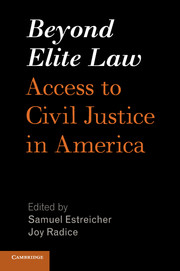Book contents
- Frontmatter
- Contents
- Beyond Elite Law
- Foreword
- List of Contributors
- Overview
- Overview
- PART I CURRENT STATE OF ACCESS TO LEGAL SERVICES
- 1 Access to Civil Justice in America: What Do We Know?
- 2 Life in the Law-Thick World: Legal Resources for Ordinary Americans
- 3 The Need for a National Civil Justice Survey of Incidence and Claiming Behavior
- 4 When Does Representation Matter?
- 5 Self-Representation and the Dismissal of Chapter 7 Bankruptcy Cases
- 6 Racial Disparities in Legal Representation for Employment Discrimination Plaintiffs
- 7 The Unemployment Action Center: A Student-Driven Response to a Legal Need
- 8 Immigrant Representation: Meeting an Urgent Need
- 9 Self-Representation, Civil Gideon, and Community Mobilization in Immigration Cases
- PART II SOURCES OF LEGAL SERVICES ASSISTANCE FOR WORKING AMERICANS
- PART III FASHIONING A REFORM AGENDA
- PART IV CREATING A CULTURE OF SERVICE
- Index
5 - Self-Representation and the Dismissal of Chapter 7 Bankruptcy Cases
from PART I - CURRENT STATE OF ACCESS TO LEGAL SERVICES
Published online by Cambridge University Press: 05 May 2016
- Frontmatter
- Contents
- Beyond Elite Law
- Foreword
- List of Contributors
- Overview
- Overview
- PART I CURRENT STATE OF ACCESS TO LEGAL SERVICES
- 1 Access to Civil Justice in America: What Do We Know?
- 2 Life in the Law-Thick World: Legal Resources for Ordinary Americans
- 3 The Need for a National Civil Justice Survey of Incidence and Claiming Behavior
- 4 When Does Representation Matter?
- 5 Self-Representation and the Dismissal of Chapter 7 Bankruptcy Cases
- 6 Racial Disparities in Legal Representation for Employment Discrimination Plaintiffs
- 7 The Unemployment Action Center: A Student-Driven Response to a Legal Need
- 8 Immigrant Representation: Meeting an Urgent Need
- 9 Self-Representation, Civil Gideon, and Community Mobilization in Immigration Cases
- PART II SOURCES OF LEGAL SERVICES ASSISTANCE FOR WORKING AMERICANS
- PART III FASHIONING A REFORM AGENDA
- PART IV CREATING A CULTURE OF SERVICE
- Index
Summary
It is difficult to demonstrate empirically that representation matters. But Rafael Pardo's discussion of his and other empirical work shows that represented debtors fare much better than self-represented debtors in individual Chapter 7 bankruptcy cases. Pardo suggests this is due in part to the complexity of the Bankruptcy Code.
The primary substantive relief that bankruptcy law provides to a financially distressed debtor is a discharge releasing him from personal liability for his pre-bankruptcy debts. But filing for bankruptcy does not guarantee that a debtor will be afforded such relief. The path to discharge involves a process laden with myriad procedural requirements. Failure to comply with them can result in a death knell for the debtor's financial rehabilitation – specifically, dismissal of the debtor's case.
Bankruptcy law is highly specialized and technical, including the provisions that relate to bankruptcy cases filed by individuals. Accordingly, to successfully navigate the complex path that ultimately culminates in a discharge, the assistance of an expert will be indispensable. Nonetheless, when individuals seek bankruptcy relief, they can either go it alone or seek the assistance of an attorney. For self-represented debtors, the question arises whether that decision makes them worse off than they otherwise would have been had they enlisted the assistance of an expert attorney.
This question has particular salience in the context of individuals who seek relief under Chapter 7 of the Bankruptcy Code. In a Chapter 7 case, an individual debtor must give up all non-exempt assets in exchange for a discharge. Year in and year out, Chapter 7 cases account for the majority of bankruptcy filings by individuals. Prior empirical research has shown that self-represented debtors in Chapter 7 fare worse than their represented counterparts. This chapter offers new empirical evidence suggesting that the plight of self-represented debtors in Chapter 7 has not improved and that serious access to justice concerns persist.
THE NATURE OF LEGAL REPRESENTATION IN CHAPTER 7 CASES INVOLVING INDIVIDUAL DEBTORS
Although bankruptcy is formally a judicial process, much of the process historically has been and continues to be managerial and ministerial in nature. For a debtor to voluntarily access the federal bankruptcy forum, he or she must file a case under the operative chapter of the Bankruptcy Code pursuant to which the debtor wishes the case to proceed (e.g., Chapter 7).
- Type
- Chapter
- Information
- Beyond Elite LawAccess to Civil Justice in America, pp. 87 - 106Publisher: Cambridge University PressPrint publication year: 2016

